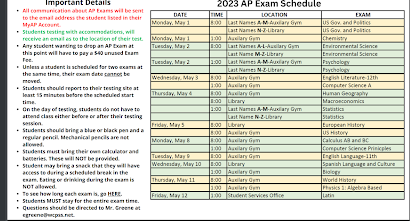With Advance Placement (AP) exams starting Monday, May 1, AP students are feeling the pressure.
Having to cram material into the shortened second semester, and relearning material from first semester has given students a stressful past few weeks. This leads to the question: Are AP classes even worth it?
Pros of AP Classes:
One of the pros of taking AP classes is being able to get ahead on college credits for free. For students who take and pass the AP exam with a 3 or higher, for most colleges will receive college credit for the equivalent course.
“I signed up for APs to get college credit and for them to look good on my transcript,” said Jackson Hobler, senior, over text.
Another pro is the boost AP course can give your GPA. AP courses are worth an extra point towards students’ GPA. So, students that do well in the course can raise their GPA which can help make them more competitive for colleges.
According to Crimson Education, “Grade Point Average (GPA) is one of the first criteria US college admissions officers will use to determine the strength of your candidacy.”
“APs have helped my GPA a lot, because I try my best to get good grades in them since they have such a strong weight on my GPA,” said Gabi Batista, junior.
Not passing the AP exam has no effect on students grade in the class, and colleges won’t see the score if the student doesn’t submit it.
AP classes are also very important for students who enjoy school and want to be pushed.
“I am pushed academically and get to learn a lot of new things… I like that APs are usually structured and the other students are hard working,” said Batista.
According to Oxford Learning, when students are not pushed, it can lead to less motivation, poor school performance and poor self-discipline. Since students are able to choose their own classes, they can choose an academic rigor that is best for them– and for some that is AP classes.
Cons of AP Classes:
A con to AP classes is the stress that it puts on students. The amount of work and material that many AP classes require students to master are a deterrent for some students.
“[AP classes] are hard because there’s a lot of work and harder material,” said Hobler.
Leesville’s AP classes are a semester long each, and the spring semester has a few less weeks to learn material. For the students who took an AP course in the fall semester, they have to review, and sometimes relearn, the material from the exam they take in the spring.
For students that take their AP class in the spring, the class is more fast paced to get students ready for the exam that takes place halfway through the 4th quarter.
“AP classes are very fast paced, especially in the spring. It can make it more difficult to retain material” said Batista.
AP classes also come with the anxiety of the exams. “I am nervous for the upcoming AP exams, but I am ready to get them over with,” said Batista.
Other students are more or less unbothered. “I’m feeling OK about the upcoming exams. I already got into college so I’m not that worried about them,” said Hobler.
Because AP exams take place before the end of the semester, teachers have to find things to do during class.
“After the exams we will probably watch movies and do projects,” said Hobler. This can be a pro for some students, and a con for others.
Depending on a student’s goals and needs, some may find AP classes and AP exams beneficial.


Leave a Reply